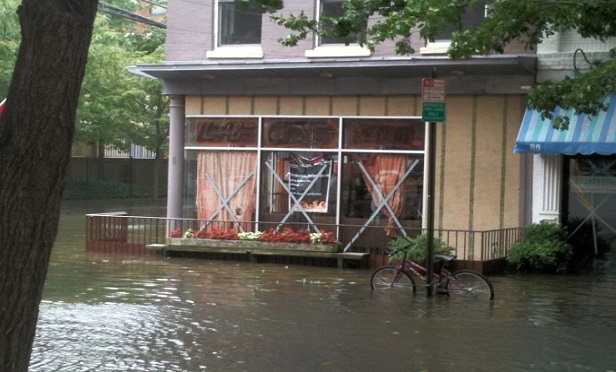 (Photo: Allison Bell/ALM)
(Photo: Allison Bell/ALM)
As if the COVID-19 pandemic weren't enough to worry about, 61% of Americans in a recent survey said they were likely to be personally affected by a natural disaster in the next three to five years, with 19% saying this was highly likely, the American Institute of CPAs reported.
However, only 15% of respondents said they had created a disaster plan to protect their finances. Worse, 27% had not taken any steps at all to prepare for a natural disaster.
Related: Business continuity plans: The new preparedness for the new normal
Concern about natural disasters is not unwarranted. Last year marked the fifth consecutive year that 10 or more weather and climate disasters with at least $1 billion of associated losses occurred in the U.S.
"In the face of a natural disaster, protecting your family from harm should be your primary concern," Gregory Anton, chair of the AICPA's National CPA Financial Literacy Commission, said in a statement.
Related: When natural disasters and emergencies strike: Retirement hardship distributions
"During the recovery process, access to financial resources and personal information is critically important. Taking action to put together a plan today will help protect your family and your finances should you ever find yourself impacted by a natural disaster."
The Harris Poll conducted the online survey within the U.S. between in early November among 2,050 adults.
Thirty-seven percent of survey participants admitted that they did not have a good sense of how much recovering from a natural disaster would cost their family financially.
Seven in 10 said such an event would have a major or moderate effect on their financial situation, including one in three who said there would be a major impact.
"It is a good idea to run through the calculations for potential damage, finding temporary housing and other recovery costs, so you can check to see if you would have enough cash on hand to cover it," Anton said.
"Review your insurance to be sure you have the right amount of coverage and that you're not overpaying. Make sure you know what is covered and don't be afraid to comparison shop periodically to see if switching makes sense."
Pollsters found good news in the fact that 73% of Americans had taken at least one step to prepare for a natural disaster. These were the actions they reported taking:
- 34% assembled a disaster supplies kit
- 32% created an evacuation plan
- 31% backed up and stored personal, medical and financial records in a safe, accessible place
- 27% evaluated insurance needs to ensure adequate coverage
- 26% took an inventory of assets and possessions for insurance purposes
- 24% contributed to an emergency saving account
- 19% created or updated an estate plan and/or will
- 19% purchased additional insurance
- 15% created a disaster plan to protect finances
The outliers were those who had taken no action to prepare for a natural disaster.
"If you haven't filed your taxes yet this year, you have the opportunity to cross two 'to-dos' off your list at the same time," Neal Stern, member AICPA's National CPA Financial Literacy Commission, said in the statement.
"After filing, take it a step further and organize your important documents and put them in a safe place. Even if you never experience a disaster, the peace of mind gained from organizing your records is well worth the few hours spent on this important task."
COVID-19 and disaster planning
Many Americans' lives have been disrupted by the coronavirus pandemic, complicating the process of preparing a plan to protect their finances from the next natural disaster. Add to that, government and institutional responses may be slower than usual to respond at present.
The AICPA suggested several areas in which American could get a head start:
Banking without the bank. If faced with a closed bank branch because of the pandemic, investigate alternative ATM locations that do not charge additional fees for using a card to obtain cash. In addition, mobile banking can allow most banking activities, including check deposits and transfers between accounts.
Insurance coverage. Review coverage with an insurance agent to ensure homeowner's or renter's insurance is up to date for changes in value, valuable items that have been added like jewelry or watches, and special risks like flooding. As a first step, know how to contact the agent, who may be working remotely or with a reduced staff under current conditions.
Safe deposit box. For documents in a safe deposit box that may be needed after a disaster, check with the bank's main office to find out how to access the box if the local branch holding it is closed or operating under restrictions.
Wills, powers of attorney and health care proxies. Legal paperwork should be up to date in the event a disaster results in incapacity, death of a loved one or serious injury. If papers need an update, it pays to contact the attorney or other professionals ahead of time as they may be working remotely under pandemic-related conditions.
Employment-based programs. An employer's HR department may be closed because of the pandemic and so unable to help manage an employee's financial survival in a disaster. It is wise to learn now how to get needed information — disability coverage or ability to borrow from a 401(k) or similar retirement plan — and request any needed updates by phone or online.
READ MORE:
© 2025 ALM Global, LLC, All Rights Reserved. Request academic re-use from www.copyright.com. All other uses, submit a request to [email protected]. For more information visit Asset & Logo Licensing.







